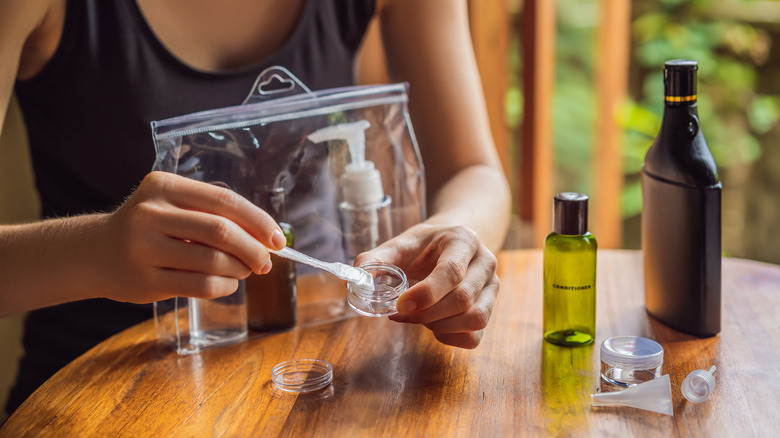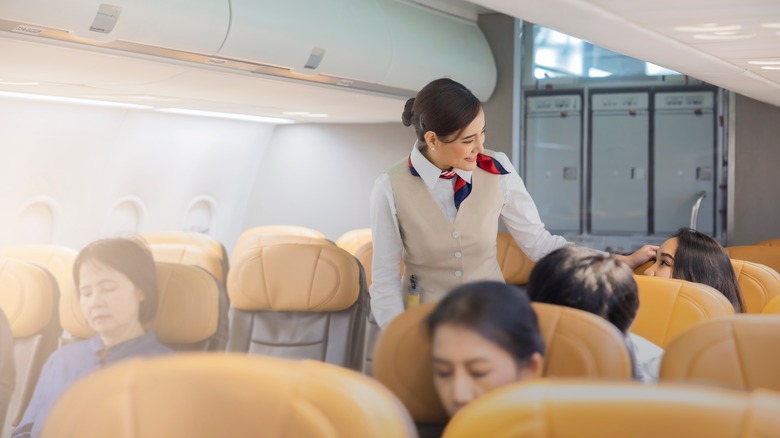When it comes to traveling by plane, there are plenty of unspoken etiquette rules you should be mindful of in order to avoid any unnecessary complications or discomfort. From knowing who really gets to lay claim to the middle seat armrest to understanding the limits of reclining your seat, respecting personal space, and managing noise levels, airplanes are a shared space — and should be treated as such. After all, no one likes to be the passenger causing disturbance, nor the person at the other end of that annoyance.
However, in between shuffling past other passengers until you reach your seat and battling over the rapidly-filling overhead bin space as you board, there’s one behavior that takes the crown in terms of how disruptive, rude, and inconsiderate it can be.
According to TikTok creator and flight attendant @cherdallas, the most “diabolical, heinous, evil thing” you can do on a plane is using your midair free time to give yourself (or anyone else, for that matter) a manicure.
No in-flight manis or pedis, please!
@cherdallas
if youre guilty of any of these u r cancelled in my book #flightattendantlife #falife✈️ #flying #flights #flightattendants #traveloutfit #airportlook #aviationdaily #falifestyle✈️ #flightreacts #springbreak #flighthouse #flight #airportoutfit #flightattendanttraining #passengerprincess
♬ Storytelling – Adriel
In a recent video published to the platform, Cher admitted that her number one pet peeve is when people thoughtlessly decide to pull out a bottle of nail polish and start painting their nails. This, according to her, means you’re basically forcing others around you to “breathe toxic fumes in an enclosed space with recycled air.”
After all, not only does nail polish smell particularly bad, but it’s also got a few other disadvantages working against it. For one, nail polish is made with some pretty harmful ingredients — including chemicals like formaldehyde, camphor, formaldehyde resin, dibutyl phthalate, and toluene. Referred to as the “Big Five,” these chemicals can damage your nails, cuticles, and even pose serious health risks further down the line.
Along with this, most nail polishes and nail polish removers are also highly flammable. While the former contains alcohol, the latter is typically made with acetone — a volatile chemical that can ignite if it catches a flame. This basically means that one wrong move could easily (and quickly) turn your plane self-care moment into chaos.
What airlines say about nail polish on-board

Although bringing a bottle of nail polish through security is allowed according to the TSA’s website, it’s important to ensure that the bottle is 3.4 ounces or less. The same principle applies to a bottle of nail polish remover. So while you technically are allowed to have a bottle of your favorite shade on you, most airlines discourage passengers from actually using them once inside the aircraft.
For example, popular airlines like United, Virgin, and Southwest haven’t explicitly banned painting your nails on a plane, but they do typically request that passengers abstain from doing so for the comfort of everyone else. Meanwhile, speaking to ABC News, an American Airlines spokesperson said the use of nail polish was simply “not allowed.”
That said, even if you don’t know where the airline you’re traveling with stands, it’s always best to just refrain and save the pampering and manicures for when you reach your destination. Oh, and while we’re at it — for the sake of cleanliness and hygiene — avoid clipping your nails, too. No one needs to see (or hear) that — especially if you’re placing your feet all over the tray table.

